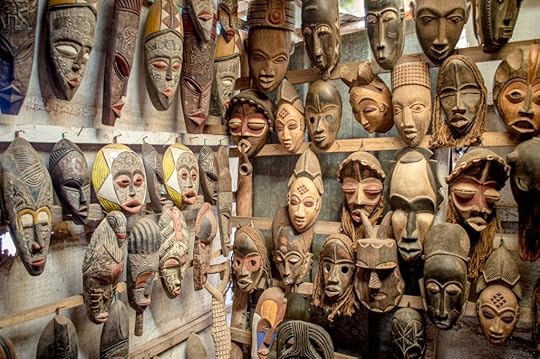Week 3, Day 4: Expanding the Self
…what are humans that you are mindful of them,
mortals that you care for them?
Yet you have made them a little lower than God
and crowned them with glory and honor. (Psalm 8:4-5)
 Mask Shop in Lome, Togo, by Philip Nalangan, from Wikimedia Commons
Mask Shop in Lome, Togo, by Philip Nalangan, from Wikimedia CommonsAs we go through life, our sense of self continues to expand and change. We may identify with our roles (“I’m a sibling, grandparent, citizen”) or our job (“I’m an architect, plumber, pastor, activist”) or our goals, values, and personal projects (“I’m just trying to be happy”).
We might grieve the loss of a job or a role and feel like part of our self has gone missing. When a family member dies, we may grieve the loss of a loved one, but also grieve the loss of who we were in relation to that person. If we lose a job or a career window closes, we may feel unmoored. As I’ve shifted from being a full-time pastor to bivocational counselor, I’ve had to adjust my own sense of self and mission in the world.
In our normal everyday life, we take our sense of self for granted. We look through it, rather than at it. Like our perceptions and automatic reactions, our self becomes part of our consciousness rather than something we actually notice.
A healthy sense of self has to be both stable and flexible. If we live long enough, everything about us will change: body, family, groups, beliefs, roles, and jobs. Some of those changes will be in our control, but many will not. We know intuitively that we need a self, a core, a set of values or a “north star” that doesn’t change with circumstance.
Donald Winnicott was an English psychoanalyst and developmental theorist who fleshed out this idea of “true self” and “false self” in the 1950’s and 60’s. He used them to describe the way we often protect our true needs and feelings by wearing a mask. He believed that a child needs “good enough” parents and opportunity to play to develop the creativity and core identity that would let them have a stable, flexible sense of self.
Certain areas of the brain play a crucial role in maintaining a sense of self. The ventral medial prefrontal cortex (vmPFC) seems to help maintain a sense of self through time. A cluster of several regions call the default mode network (DMN) creates a narrative about self. The DMN can also get caught in a negative loop of worry or rumination, and shifting its storytelling patterns is part of treating depression and anxiety.
I believe the story of the incarnation has the power to shift our story about the self. By slipping into a body and becoming a self that included but also transcended his job as a builder, his beliefs as a Jew, or his role as a son, God-in-Christ raises questions about our own sense of self. As various layers of the self are stripped away, we begin to understand that our primary identity is simply this: Beloved.
Prayer: Creator, what are human beings that you are mindful of them? What am I? Only your love makes us real. Amen.



